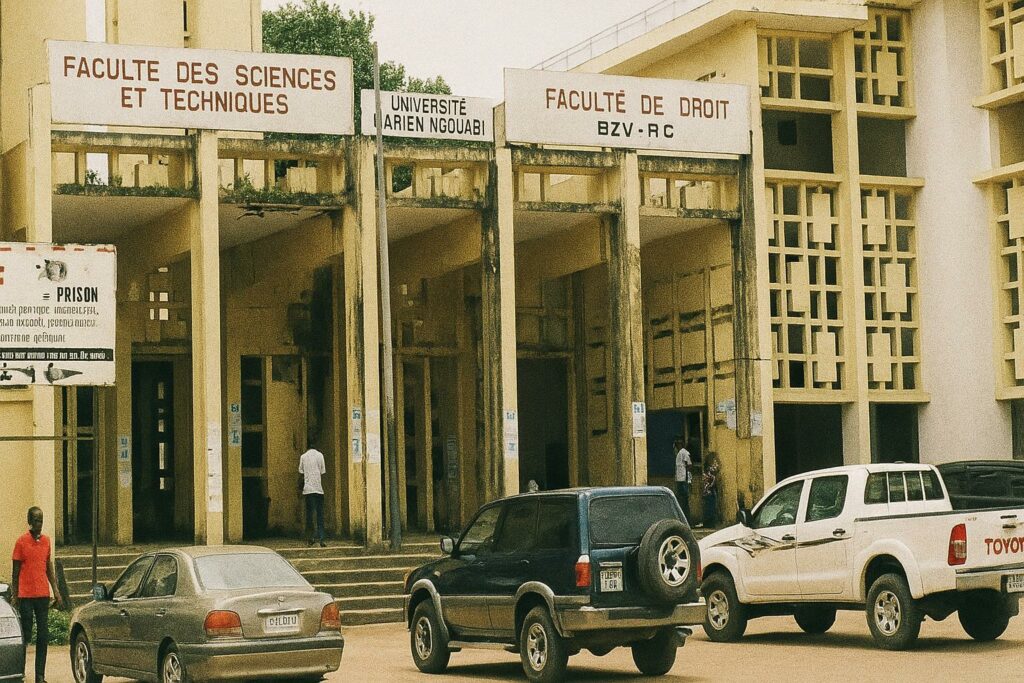A flagship campus at a delicate juncture
Few institutions in Central Africa carry the symbolic weight of Université Marien-Ngouabi, heir to the 1971 National University of the Congo and alma mater of much of the nation’s technocracy. Its 30,000 students and nearly 2,000 academic and administrative staff make it a bellwether for social sentiment in Brazzaville. On 26 June 2025, at the Bayardelle complex overlooking the Congo River, the inter-union college convened to review the implementation of compromises reached six months earlier. Union leaders acknowledged progress on pedagogical equipment and infrastructure but underlined that salary arrears – notably those for August and September 2024, as well as May and June 2025 – remained unresolved, despite an executive pledge made on 27 December 2024.
Historic commitments amid fiscal headwinds
In late 2024 the Ministry of Higher Education and the university presidency negotiated a phased settlement after a three-month strike paralysed laboratories and lecture halls. According to government communiqués cited by Les Dépêches de Brazzaville, the state agreed to clear four months of arrears and initiate a broader protocol covering overtime and vacation pay. Yet 2025 opened under tighter budgetary ceilings; international energy prices softened, constraining revenues in a hydrocarbon-dependent economy, while post-pandemic recovery programmes absorbed significant fiscal space (World Bank data, 2025). Officials close to the Treasury emphasise that higher-education wages have nonetheless remained a priority line item, albeit subject to cash-flow sequencing intended to protect macroeconomic stability.
Calibrated union strategy, measured rhetoric
Against this backdrop, the inter-union’s latest communiqué employed a notably calibrated tone. Spokesperson Dr. Éric Nkouka insisted that union action would remain “within the bounds of republican legality, respectful of the dialogue culture encouraged by President Denis Sassou Nguesso.” He added that targeted measures could be envisaged should delays persist, but expressed confidence that “the spirit of the December agreement can still prevail.” Observers from the Agence d’Information d’Afrique Centrale note that the union’s language reflects an awareness of public fatigue after previous stoppages and of the competitive pressures posed by private universities expanding in Pointe-Noire and Dolisie.
Government response and the arithmetic of priorities
Contacted for comment, a senior official at the Ministry of Finance described the wage backlog as “an administrative décalage rather than a structural default.” She pointed to the recent disbursement of 2.3 billion CFA francs for laboratory refurbishment and affirmed that the salary tranches would be released “in synchrony with cash-management cycles already shared with union delegates.” In parallel, the Ministry of Higher Education reiterated its commitment to a new governance charter that would grant faculties greater budgetary autonomy, thereby reducing reliance on central transfers over the medium term. Analysts in Jeune Afrique argue that such reforms could mitigate future tensions by aligning payroll management with faculty-generated revenues from research contracts and continuing-education programmes.
Regional perspectives on academic labour relations
Across the continent, universities wrestle with similar dilemmas. In neighbouring Cameroon, staff at the University of Yaoundé I accepted a staggered-payment formula in 2023 to safeguard the academic calendar, while Ghanaian lecturers secured a cost-of-living allowance after weeks of negotiations earlier this year. The Congolese inter-union appears mindful of these precedents, hoping to retain leverage without jeopardising semester examinations scheduled for late July. Diplomatic observers stationed in Brazzaville suggest that stable campus conditions are also in the interest of external partners such as UNESCO, which is preparing to launch a regional centre of excellence in climate science on the Marien-Ngouabi campus.
Scenario outlook for Congo’s higher-education ecosystem
Looking ahead, three variables will shape the trajectory of the dispute. First, the speed at which the Ministry of Finance converts written commitments into cash transfers will determine union strategy in the short term. Second, the finalisation of the new protocol of agreement – currently undergoing legal vetting – could institutionalise consultation frameworks that outlive the present episode. Third, broader economic indicators, notably oil output projections and debt-service obligations, will influence the fiscal space available for social sectors. For now, both sides appear to recognise the high stakes: a prolonged strike could imperil graduation timelines and, by extension, national workforce planning objectives outlined in the Plan National de Développement 2022-2026.
A cautious optimism tempered by fiscal realism
While the inter-union’s warning underscores persistent grievances, the tone of discourse in Brazzaville remains markedly more conciliatory than during the 2024 walkout. That evolution reflects a broader governmental pivot toward anticipatory social dialogue and a union leadership keen to preserve the university’s academic credibility. In the words of Professor Marie-Hélène Okié, a political scientist at the institution, “the art of compromise is becoming part of the university’s curriculum.” As fiscal engineers and faculty representatives resume technical sessions next week, the Congolese capital will be watching closely, hopeful that its venerable alma mater can transform labour turbulence into an opportunity for sustainable reform.

